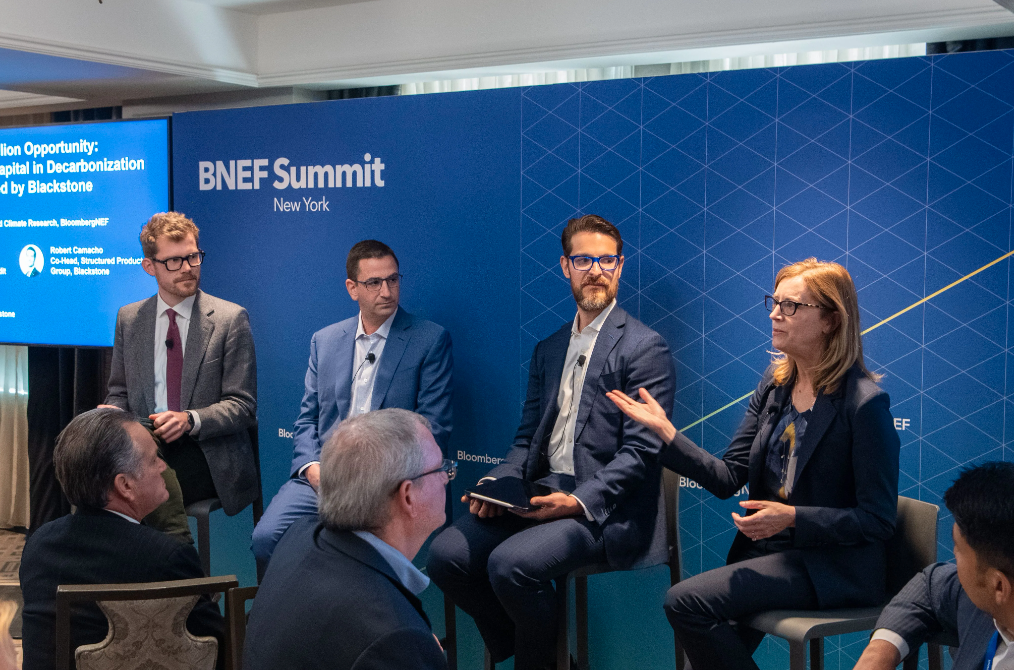Takeaways From the 2022 Bloomberg New Energy Finance Summit
Blackstone leaders joined the Bloomberg New Energy Finance Summit to offer their perspective on the challenges and opportunities presented by climate change and the energy transition.

Rob Camacho is Head of Asset Based Finance within Blackstone’s Structured Finance Group. Robert Horn is Global Head of the Sustainable Resources Group for Blackstone Credit. Dr. Jean Rogers is Global Head of ESG at Blackstone.
Experts estimate that it will take over $100 trillion by 2050 to avert the worst effects of climate change. At Blackstone, we are investing in companies and projects that support the energy transition and climate change solutions. Three of our leaders recently spoke at the Bloomberg New Energy Finance Summit in New York about trends they are seeing in the space and the role that private capital is playing in accelerating a stronger, more sustainable future.
Necessity inspires innovation.
Today’s high energy prices pose significant challenges for consumers and businesses alike, but history suggests that environments such as this can ultimately drive progress towards a cleaner, more affordable energy future.
“We see similarities between the 1970s and today, including concerns regarding energy security. That experience spurred innovation focused on fuel efficiency and investment in many technologies we use today. This history gives me confidence that we can effectuate the energy transition, building new industries and new value chains going forward.”
― Robert Horn, Global Head of Sustainable Resources, Blackstone Credit
You can’t diversify away from climate risk.
Climate change will impact all areas of the global economy, requiring investors to rethink their approach to risk. Reporting on carbon emissions is a good place to start; however, to effectively manage a risk at this scale, investors must tailor their strategies to the most material factors of a given business or industry.
“You can’t diversify away [from climate risk]. You have to manage the outcomes and do it in a way that is meaningful . . . and focus on what sectors are going to have really strong tailwinds and which are going to face headwinds.”
― Jean Rogers, Global Head of ESG
Moving the needle on climate requires significant carbon reduction.
We’re living in a “good rush”: Year-on-year, the global sustainable fund universe expanded by 53%, indicating intense investor appetite for sustainable vehicles. However, significant carbon reduction more broadly will require active management and concrete, ambitious decarbonization KPIs. Private market investors must play a significant role in accelerating the energy transition in partnership with portfolio companies.
“At Blackstone, we’ve set a 15% emissions reduction target— an aggregate, three-year goal that applies to all new investments where we control the energy usage. We start with energy conservation efforts and then move into procurement, offsets and carbon renewal. Our portfolio companies don’t want to decarbonize at any cost; they want to do it in the most efficient way and end up not just lower-carbon, but also more competitive.
― Jean Rogers, Global Head of ESG
Credit has a crucial role to play.
Flexible capital and the ability to deploy it at scale are essential to funding decarbonization. Credit is well-suited to capital-intensive projects that are typical for the energy transition, and instruments like sustainability-linked loans can incentivize companies to make material progress on specific ESG metrics.
“Sustainability-linked loans can help drive value— not only for the credit holder, but also for equity holders and for the business overall. We recently invested in a building efficiency company and identified three important KPIs: renewable energy procurement, carbon avoidance and workforce diversity. We incorporated these metrics into the pricing of the loan, and our ESG team tracks that annually along with third parties. We’ve found it to be a great tool both for sustainable companies and companies in various stages of their sustainability journey.”
― Robert Horn, Global Head of Sustainable Resources, Blackstone Credit
“Blackstone manages over $100 billion of insurance capital and we’re looking to match long-term, high-quality contracts with long-term, high-quality insurance liabilities. Energy transition infrastructure is a perfect fit for those needs: It’s stable, it’s long-term and it requires low-cost, scalable capital. We’re excited to bring the energy transition forward by marrying our energy expertise and our structured finance expertise with our insurance capital.”
― Rob Camacho, Head of Asset Based Finance, Blackstone Structured Finance Grou
Since 2019, Blackstone has committed approximately $16 billion in investments that the firm believes are consistent with the broader energy transition. We have also launched a Sustainable Resources Platform within our Credit business. The Platform will invest across the credit spectrum and focus on a broad range of sectors, including residential solar and home efficiency, electric vehicles and green financings that fund environmental projects. Across our businesses, we see an opportunity to invest an estimated $100 billion in energy transition and climate change solution projects over the next decade.
Learn More about Blackstone’s sustainability efforts.

